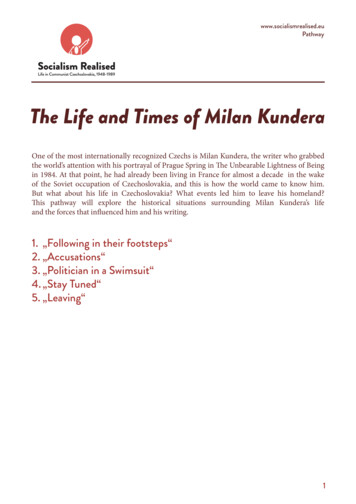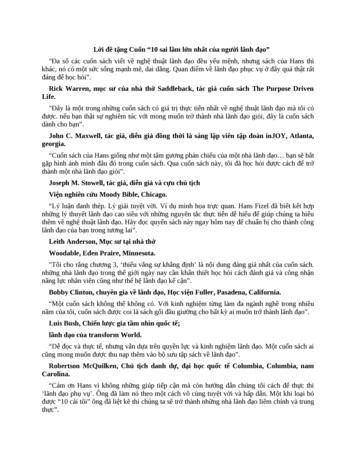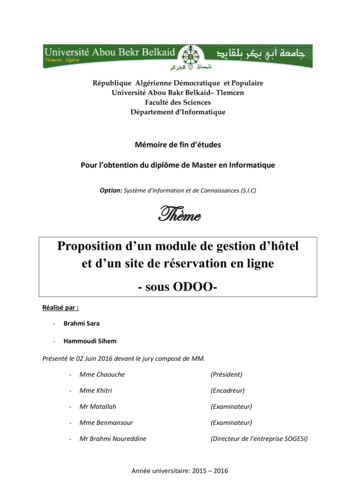
Transcription
www.socialismrealised.euPathwayThe Life and Times of Milan KunderaOne of the most internationally recognized Czechs is Milan Kundera, the writer who grabbedthe world’s attention with his portrayal of Prague Spring in The Unbearable Lightness of Beingin 1984. At that point, he had already been living in France for almost a decade in the wakeof the Soviet occupation of Czechoslovakia, and this is how the world came to know him.But what about his life in Czechoslovakia? What events led him to leave his homeland?This pathway will explore the historical situations surrounding Milan Kundera’s lifeand the forces that influenced him and his writing.1. „Following in their footsteps“2. „Accusations“3. „Politician in a Swimsuit“4. „Stay Tuned“5. „Leaving“1
www.socialismrealised.euPathwayFollowing in their /following-in-their-footsteps/Questions: What emotions are the people in the photo feeling? Are you inclined to trust the soldier in the photo? Why or why not? What purpose could having photos like this in the media serve?Many people either do not know or choose to ignore the fact that as a young man,Milan Kundera was an ardent communist supporter. This particular set of beliefs,however, makes some sense given what he had seen so far in his life. Kundera was partof the generation that came of age during World War II, when the Czech lands wereunder Nazi control as the Protectorate of Bohemia and Moravia. At the war’s end, boththe older and younger generations had been disappointed by the liberal democratic system from before the war, and as a replacement they were draw to the political systemof Prague’s liberators — the Soviets. The picture, taken soon after Prague’s liberation,shows a Soviet soldier walking with a young Czech girl, who is dressed in her nationalcostume and carrying a Czechoslovak flag. Many young, educated idealists became earlycommunist supporters in Czechoslovakia, and Milan Kundera was resolutely amongthem.Take a look at these stanzas from “The Great Parade”, a poem from his first poetry collection, Man, a wide garden (Člověk, zahrada širá), published in 1953. What can you gatherabout the tone of the poem?The Great ParadeIt was a few days after the huge war.The morning air glittered over the cities’ ruins.A workers’ parade set out from the suburban buildings.One, two flags and some red ribbons.2
www.socialismrealised.euPathwayAnd each of the workers carried on his bodythe burden of life, a bag full of pain,and the old insults, charred spears,protruded from those bags, casting long shadows. The parade went on and on and the years went behind itand whoever went against it was blown into the ditches.The roads they traveled on raised up in their honorslender poplars like decorated spears.And those bags of suffering gradually disappeared,song sounded out all around, larks flewand all went lightly, as though with some buoyancyunder a canopy of song, bells, and calls.They went lightly as though in a dance and from the dust of their tracksrose up buildings and white cities in the groves.And an old worker cried out: “Who will remember my grave?I’m only just starting! And everybody is starting!”Kundera based this poetry collection in the Stalinist ideology, and you can finda lot of imagery typical to Stalinist-era propaganda in the stanzas above. Paradesin general were a regular feature in any major celebration throughout the communistregime, and the red of the ribbons was the same red that was such a visible symbolof communism everywhere. The workers, the class that communism means to give voiceto, are the heroes of the poem, honored even by the roads they travel on. The buildingsand white cities that rise up behind them (contrast that with the ruins from the secondline of the first stanza) are also emblematic of the era, as the communist governmentsput a lot of effort into modernization, a large part of which was building new, modernstructures. In this new, communist world imagined in Kundera’s poetry, the workers arefinally able to shed their burdens and live happily.3
tions: Who does the speaker praise in the video, and why? What do you think the speaker’s goal is? How would you react if you saw something like this on TV? Can you imagine howit might inspire you to change your actions somehow?When Stalinism eventually became reality in Czechoslovakia instead of just a sought-after dream, many of those who had originally backed it ended up feeling disillusionedbecause of the regime’s harshness. One particularly chilling tactic that the governmentused was the show trials, an example of which you see in the video above. Kunderaand his fellow idealistic communists would have seen that the rosy idea of communismthat they had supported was very different from what eventually unfolded in real life.Kundera himself was kicked out of the party in 1950 for “anti-Party activities”, but here-joined in 1956, and his later actions would suggest that he still retained some loyaltyto the communist ideals, if not to the way that communism had been put into practicein Czechoslovakia.Some of Kundera’s poetry from that first collection addressed the show trials head on.Read this excerpt from the beginning of his poem “Love and Life”:The words still shivered through the hall:The words still shivered through the hall:He became estranged from his own fatherHe became estranged from his own party He saw the words, black wingsthat sharply pound the brickwork,he felt those words on his facelike a chilling frost4
www.socialismrealised.euPathway–estranged, estr–estranged,a brand that won’t disappear from his forehead“I’m just not, comrades,”he wanted to yell, “I’m not the enemy!”He placed his identity card on the tableand thenwordlesslyhe went.Estranged, estr– black birdsbeat on the walls.He went and all eyesavoided him.What atmosphere does the poem create? How is this perspective differentfrom the perspective that you got in the “Accusations” video?5
www.socialismrealised.euPathwayPolitician in a politician-in-a-swimsuit/Questions: Without knowing anything about the situation, what sort of public figure would youguess that the man in the photos is? Why? What do the photos tell you about the general atmosphere in Czechoslovakia duringPrague Spring? How would you feel towards a politician who was willing to act this way in frontof his citizens?Prague Spring in 1968 and the period of liberalisation leading up to it offered MilanKundera the other reform-minded communists what they thought was exactly the sortof communism that they had imagined. Alexander Dubček, the man pictured above,ai m ed to institute what he called “socialism with a human face”, which was to be socialism with its harsh edges stripped away — a form of socialism that Kundera and his fellowsstrongly supported. For people like him, Prague Spring was a time of great optimism —a short-lived dream come true. While Prague Spring was going on, Kunderaand the dissident and eventual president Václav Havel argued in the media, with Kundera defending the position that Prague Spring could bring about lasting freedom withinthe framework of a communist government, and Havel maintaining that the systemneeded a complete overhaul rather than just a reform.One of the beginnings of Prague Spring was, in fact, the Writers’ Congress of 1967,so in a way the writers spearheaded the entire movement. At that meeting, Kunderamade a speech that included the following passage:The fundamental ethical principle of modern cultureIn a letter to Helvetius, Voltaire wrote a splendid sentence: “I disapprove of what you say,but I will defend to the death your right to say it.” This is a formulation of the fundamental ethical principle of modern culture. Whoever returns in history to before this principleis taking a step from the modern age to the middle ages.6
www.socialismrealised.euPathwayAny kind of suppression of opinions, even the violent suppression of false opinions, leadsagainst rights in its consequences, as it is only possible to attain rights in a dialogueof opinions that are equal and free. Any kind of intervention into the freedom of thoughtand speech, however more discreet the technology and so-called censorship is now,is a scan dal in the twentieth century.Must freedom have its borders?I know that when you say freedom, some people immediately get hay fever and counter thatfreedom must have its borders. It is known that every freedom has its borders, already givenby, for example, the extent of contemporary knowledge, education, prejudices, etc. Exceptthat, after all, no new progressive period has ever defined itself by its limitations!It’s just that for us, there has always been more virtue in guarding the borders than in goingbeyond them. The sociopolitical conditions at any given time need to justify the fact thatthey limit spiritual freedom in various ways. But great politics are those that put era-defining interests over present interests.What conception of freedom does Kundera describe in the speech? Where does he saythe limitations of freedom come from? What do you think he means by what he saysin the last sentence, and can you give an example in history of when someone put era-defining interests ahead of present interests?7
www.socialismrealised.euPathwayStay y-tuned/Questions: What is the tone of the radio broadcast? In what ways are the tone of the broadcast and the atmosphere in the above photodifferent? How did the political situation change in the month that separates them? Imagine hearing something like this in real time. How would you feel? How wouldyou react?For many of those who had so enthusiastically supported and cheered for the re formsthat came with Prague Spring, the Soviet invasion that put an end to it in Augustof 1968 not only caused a huge disruption in their lives, but also eventually contributedto a change in their beliefs. The hope that the Prague Spring had engendered wasgra dually replaced by cynicism, as the Normalisation regime was in no way similarto the version of communism that they had envisioned. Although Kundera himself didnot give up hope immediately after the invasion (in fact, he did not leave the countryuntil seven years afterwards, in 1975), both Prague Spring and the invasion turn upin his most famous works, The Unbearable Lightness of Being and The Book of Laughterand Forgetting, as important turning points. In the material below, you can seethe fallout from the invasion as portrayed in the movie version of The Unbearable Lightness of Being.8
ocialismrealised.eu/catalogue/leaving/Questions: Describe the characters emotions at the various points of the clip. The beginning?The middle? The end? Can you imagine an event that would make you want to leave your homeland?Why or why not? What would it be?A central theme of The Unbearable Lightness of Being, Kundera’s most internationallywell known work, is that of “eternal return” — a principle that most famously comesfrom Friedrich Nietzsche’s work, which posits that the universe and all of the eventsthat happen in it repeat themselves eternally, giving great weight to each of those events.The novel argues for the opposite – that each person lives his life only once,and therefore each event and decision has an “unbearable lightness”; as the main characterwe see in the clip states towards the beginning of the novel, “if we only have one lifeto live, we might as well not have lived at all”. In this conception of life, though, eachevent and decision takes on a certain weight because once made, they cannot be changed, and the person making them cannot know the results before they come about. Manyof Kundera’s books feature events from his own life; perhaps with this plot elementof The Unbearable Lightness of Being, he explores what the events in his life mighthave been if he, like Tomáš and Tereza, had decided to leave Czechoslovakia right afterthe 1968 invasion instead of waiting until 1975.9
Milan Kundera was an ardent communist supporter. This particular set of beliefs, however, makes some sense given what he had seen so far in his life. Kundera was part of the generation that came of age during World War II, when the Czech lands were under Nazi control as the Protectorate of Bohemia and Moravia. At the war's end, both











